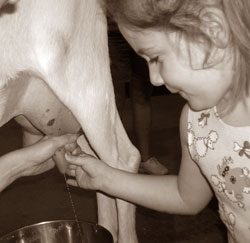|
With escalating prices of imported milk powder:
Crowning the goat as the queen of milk
L. P. Samarasinghe
|

Goat milk: Babies and adults will find it a miracle food
|
The State, many private institutions, and individuals have been
jolted to the realisation that the country needs to build its milk
industry, in the context of the escalating prices of imported milk
powder.
Some speak of the foreign milch cow, others of the heavy milking
Indian Murrah buffalo. In the climate of indecision, is it not wise to
pause and ponder, and not hastily rush in and probably burn oneself, and
not just the fingers.
For extensive dairying, the country will require land. Land is also
extensively required for vegetable and fruit crops. Tea, rubber, and
coconut, three major crops have taken up land and are well established.
Inter-cropping goes on and cattle and goats are run on some of them,
but for a concerted effort in building up a milk industry more thought
must be directed to the type of ruminant the country should foster. The
neglected village agriculture will require land if it is to expand.
Milch cattle will require a considerable acreage.
Stall-feeding will afford an opportunity for work to the village
unemployed youth, provided the present day trousered youth will not
think it infra dig. With good quality grass, which the cow responds to,
the land requirement will be lower, than that required by the grazing
animal. The grazing cow will take up land which will otherwise be taken
by the farmer to grow vegetables.
It has been estimated that a cow and its calf will require as much as
30 acres of land. On that extent the goat will be prodigiously
productive. Many foreign companies, which are now Ceylonised, are seeing
vistas opening for intrusion into agriculture, both plant and animal.
With the animal entering into the equation, it will be advisable to
assess the relative importance of the cow as compared to the goat and
their importance to the economy.
The cow which is a temperate zone animal will do well in the colder
climes of the upcountry hills, but land is taken up predominantly by
tea. In the gullies and ravines grows luscious grass which permit the
rearing of animals, chiefly cows, though the goat too has been permitted
a corner.
The goat, however, is found in larger numbers in lower altitudes
where soil is more gravelly; harbouring hardier thorny plants which are
often used for hedges.
The goat is reputed to have the toughest mouth amongst ruminants and
readily takes up coarse fodder even with low nutrient content, making it
very productive in a country like Sri Lanka where much of the vegetation
is relatively succulent.
Hardy, thorny plants are relished. Briefly put the goat is the best
choice for Lanka's tropical climate, and chiefly in the flat lowlands
where rainfall is rather low. The goat prefers dryness.
Before going further, those entrusted with the onerous task of
nurturing animal husbandry in a predominantly agricultural country must
investigate and make use of all knowledge relating to the cow and the
goat. The milk of the cow contains a high percentage of the amino acid
histamine which tend to bring on rashes.
Sudden unexplained deaths of new born babies up to the age of about
six months has been traced to the consumption of the milk of the cow.
Mothers in their hurry to wean babies either due to ill health or
unavailability of time, rush for the cheaper milk of the cow, only to
unexpectedly lose the child and believe it is fate, though in reality it
is anaphylactic shock, which is the body's refusal to accept a foreign
protein.
The allergies that are brought on by the milk of the cow are legion.
Neurotic indigestion, constipation, insomnia, peptic ulcer, air passage
complications like runny nose, sneezing, watering eyes, vomiting, colic
diarrhoea and migraine headaches, nettle-rash, eczema, dermatitis, and
even asthma is aggravated by cow milk.
With all these known draw backs caused by cow milk the sensible
alternative is the presently costlier milk of the goat, which is known
to be next to the milk of the human mother.
Though presently expensive with sustained rearing goat milk price
will move down. The cost of mediation to the State will come down. The
misery of patients will be a thing of the past, and the goat will be
crowned Queen. The only known permanent remedy for Asthma which is known
to harass 300 million people around the world is the milk of the goat.
Western doctors who treat patients symptomatically offer drugs which
are only temporary palliatives. The permanent cure is the milk of the
goat, which should be an essential in mans daily. The cup of coffee tea
or cocoa should all carry goat milk for a health nation. The great
secret is that unlike the cow that is confined to grass, known for its
low nutritive properties, the goat nibbles on a variety of herbs.
The tourist industry will be able to offer kid meat to foreign
travellers to whom it will be like venison, a gourmet's delight. Goat
milk will be the panacea for all allergies, including those caused by
the consumption of cow milk. Both babies and adults will find it a
miracle food, like a food of the Gods. |

